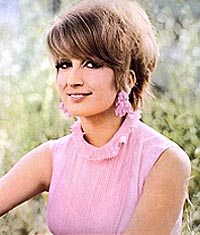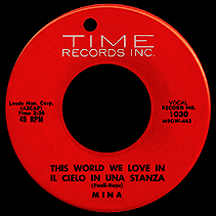MINA
This World We Love In
(Il Cielo in Una Stanza)
This is the story of a woman who's experienced the highs and lows of pop music superstardom, a singer first known by the peculiar name "Baby Gate," a survivor of the tabloids who's still active, and if you're from North America there's a good chance you've never heard of her! Those of you from Europe or Japan, well, you already know who I'm talking about: Italian sensation Mina.
Anna Maria Mazzini was born in 1940 in Busto Arsizio, Lombardia, near Milan, Italy. Her family moved about 80 miles southeast to the city of Cremona when she was a young girl. As a teenager, like so many others she became obsessed with rock and roll, sneaking off to Milan to hang out in clubs, soaking up the sounds and the scene. She considered a career as an accountant, but a chance opportunity to do an impromptu amateur performance at La Bussola, a club near Lucca, Loscana in western Italy, altered her course. Record producer David Matalon offered Anna a limited contract, resulting in an English-language single, "Be-Bop-A-Lula," originally made famous by Gene Vincent (backed with The Kalin Twins' "When"), under the name Baby Gate (in tribute to gospel group The Golden Gate Quartet). What a strange single this was...she slurred her words, mumbling in a language foreign to her, innocently gender-bending Vincent's lyrics ('Be-bop-a-lula, she's my baby') that no one had bothered to rewrite. But it was a start, and by 1960 she ditched the idea of doing American covers (for the time being), replaced her professional name Baby Gate with Mina, and hit number one in Italy with "Tintarella di Luna," or "Moon Tan" in English. One thing she didn't abandon was her predilection for rock and roll, sometimes delivered in a loud, screechy style, prompting the Italian press to nickname her "The Queen of Screamers."
Next came Mina's invasion of America, which began and ended in May 1961 with "Il Cielo in Una Stanza" (written by Gino Paoli), a stylistic switch to pop ballad singing from late '60 and a number one hit in Italy that was the year's biggest-selling single in that country. The push was on to promote her globally and it worked in quite a few places, but in the U.S. she failed to gain a foothold; despite a fair amount of airplay in New York City, radio stations in most other markets didn't follow suit. The ballad approach was a successful move, however, showcasing Mina's ability to deliver high notes with a powerful, anguished intensity. She continued to mix things up, performing the beautifully-written melodies so many Italian composers are well known for in a bluesy and uptempo jazz-styled manner, and had by this time developed a sensual stage presence with shaking, moving and wild gesturing. As a result the public came up with a pet name of its own for her: "La Tigre di Cremona" (The Tiger of Cremona). Anyone with two unusual nicknames was surely a major star!

Then the unthinkable happened: a scandal from which she could never hope to recover (or could she?). In 1962, Mina began a relationship with actor Corrado Pani, perhaps best-known for his film work with famed Italian director (and Academy Award nominee) Luchino Visconti. Pani was married and Mina made no effort to cover up the affair, which resulted in pregnancy and an illegitimate son born in April 1963. The Catholic church was highly critical of the whole thing and Radiotelevisione Italiana (RAI), wielding great control similar to our own FCC, banned her from radio play and TV appearances. The fans were more forgiving, though, and after a brief time RAI ended the ban due to public demand. The state organization wasn't finished with her, though. As her star rose, her behavior loosened...she sexed up her image with bleached-blonde hair, heavy eye makeup, provocative dress and perhaps the most immoral offense of all, smoking in public places! The authorities were tearing their hair out and the public was fascinated by her every move. Further attempts to restrict her music in addition to film, television and public appearances were unsuccessful.
In 1964, Mina's Italian-language cover version of Jody Miller's American hit "He Walks Like a Man" became the best-selling record of the entire year in Italy, the second time she had pulled off that difficult feat. Another American song she released in '64 was "It's a Lonely Town" ("Citta Vuota," which translates as "empty city"), released a few months earlier by Gene McDaniels. Mina's star shone bright for another decade or so, during which time she worked with some of the top producers in Italy, including Lucio Battisti (known in the U.S. as cowriter of "Bella Linda" by The Grass Roots) and Ennio Morricone (hugely popular for, among other things, the scores to the Sergio Leone "spaghetti westerns" starring Clint Eastwood).
It's an intriguing story of a celebrity nearly unknown in the States, barely denting the charts for a few weeks in 1961, and a precursor to the far more common tabloid scandals we have now which, in Mina's case as well as today, won't necessarily end a career but can actually promote it to greater familiarity and heights. But back to the song in question: "Il Cielo in Una Stanza" is one of those magical records, a powerful love song based purely on melody and vocals, independent of what the lyrics might be saying. All I know about the song's meaning is in the translated title, "The Sky in a Room," which opens up many imaginative possibilities. When released in America, it was retitled "This World We Love In," which has nothing to do with the actual title (Don Raye is shown as cowriter on the single, which suggests English-language versions by other artists). The actual words to the song are unknown to me and I've never attempted to translate them. Frankly, I prefer not to know what she's saying. Mina's beautiful, haunting, heartbreaking performance is all I need.


